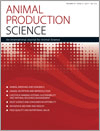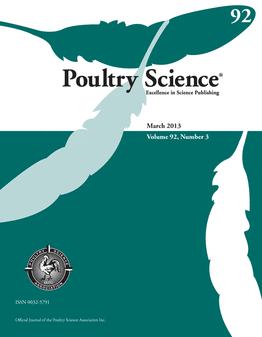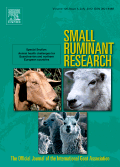
Animal Production Science
Scope & Guideline
Exploring the Future of Animal Science and Food Production
Introduction
Aims and Scopes
- Animal Nutrition and Feed Efficiency:
Research on optimizing diets for various livestock species, including the effects of different feed additives, supplements, and forage types on growth performance and overall health. - Animal Welfare and Behaviour:
Studies addressing the welfare of livestock in various production systems, exploring behavioral responses, stress management, and the impacts of environmental factors on animal well-being. - Genetics and Breeding:
Investigations into genetic parameters, breeding strategies, and genomic tools aimed at improving livestock productivity, disease resistance, and adaptation to environmental stressors. - Sustainable Production Practices:
Research focused on sustainable agriculture practices that minimize environmental impacts, including studies on greenhouse gas emissions, waste management, and resource utilization in animal production. - Health and Disease Management:
Research on the control of diseases in livestock, including nutritional interventions, vaccination strategies, and the use of probiotics and other health-promoting additives. - Meat and Milk Quality:
Investigations into factors affecting the quality of animal products, including nutritional influences, processing methods, and consumer preferences.
Trending and Emerging
- Precision Livestock Farming:
There is a growing focus on using technology and data analytics to enhance livestock management, including the integration of sensors and AI for monitoring animal health and productivity. - Climate Change Adaptation Strategies:
Research is increasingly addressing how animal production systems can adapt to climate change, including studies on forage management, nutrient efficiency, and animal resilience. - Alternative Protein Sources:
The exploration of alternative protein sources, such as insect meal and plant-based supplements, is gaining traction as a sustainable approach to meet the growing global demand for animal protein. - Microbiome Research:
The role of gut microbiota in animal health and productivity is a rapidly emerging field, with research focusing on how microbial populations can be manipulated to improve growth and disease resistance. - Animal Welfare Innovations:
There is a heightened emphasis on innovative practices that enhance animal welfare, including environmental enrichment and stress reduction strategies in various production systems.
Declining or Waning
- Traditional Breeding Methods:
Research focusing on conventional breeding methods is declining as genomic selection and biotechnological approaches gain traction, offering more precise tools for improving livestock traits. - Ruminant Production in Controlled Environments:
Interest in ruminant production systems in highly controlled environments is waning, with a shift towards more extensive and sustainable grazing systems that align with modern animal welfare standards. - Single-species Diet Studies:
There is a noticeable decrease in studies exclusively focused on single-species diets, as researchers increasingly recognize the benefits of multi-species grazing and diverse feeding strategies.
Similar Journals

POULTRY SCIENCE
Unlocking the potential of poultry science for global impact.POULTRY SCIENCE is a premier, peer-reviewed journal published by ELSEVIER, dedicated to advancing the field of avian biology and poultry production, encompassing a wide array of topics from genetics and physiology to nutrition and management practices. With an impressive impact factor and inclusion in the Q1 quartile for both Animal Science and Zoology as well as Miscellaneous Medicine, this journal is recognized as a leading source of high-quality research among its peers, ranking 17th out of 490 in its category. Since transitioning to Open Access in 2020, the journal has expanded its reach, allowing global accessibility to its significant findings, which are crucial for researchers, industry professionals, and students alike. The journal’s continuous publication from 1965 to 2024 underscores its long-standing commitment to fostering innovation in poultry science, making it an invaluable resource for anyone involved in the progression of this vital sector.

TROPICAL ANIMAL HEALTH AND PRODUCTION
Unveiling breakthroughs in tropical animal welfare.Tropical Animal Health and Production is a prominent academic journal dedicated to advancing the field of animal health and production in tropical environments. Published by Springer, this journal has been a pivotal platform for researchers and professionals since its inception in 1969, serving as a vital resource for innovative studies and advancements up to 2024. With impactful research findings, it holds a respectable Q2 ranking in both Animal Science and Zoology, and Food Animals, demonstrating its significance within these fields. The journal’s commitment to high-quality research is further reflected in its Scopus rankings, with a notable position in Agricultural and Biological Sciences and Veterinary Food Animals. Although it is not an open-access publication, the insights and knowledge shared within its pages are invaluable for those engaged in tackling the challenges of animal health and production in the tropics. Researchers and students will find Tropical Animal Health and Production an essential source for the most recent advancements and practices in veterinary science and animal care for food-producing species.

INDIAN JOURNAL OF ANIMAL SCIENCES
Fostering scholarly discourse in veterinary studies.INDIAN JOURNAL OF ANIMAL SCIENCES, published by the Indian Council of Agricultural Research, is a vital resource for researchers and professionals in the fields of animal science and veterinary studies. With its ISSN 0367-8318, the journal has been in circulation since 1971, providing a platform for innovative research and scholarly discourse. Despite its current Q4 ranking in Animal Science and Zoology and a Q3 ranking in Veterinary (miscellaneous), the journal aims to enhance its impact by promoting high-quality research that addresses the challenges in animal husbandry and veterinary practices in India and beyond. The journal does not operate under an Open Access model, which may limit certain dissemination opportunities; however, it remains indexed in Scopus, with a focus on elevating the standards of animal sciences. The INDIAN JOURNAL OF ANIMAL SCIENCES is pertinent for anyone looking to contribute to or stay informed about significant developments in animal sciences.

SMALL RUMINANT RESEARCH
Bridging research and practice for enhanced ruminant welfare.SMALL RUMINANT RESEARCH is a premier academic journal committed to advancing the field of animal science, specifically focusing on the study and management of small ruminants. Published by Elsevier, this esteemed journal holds a significant standing, ranked in the Q2 category for both Animal Science and Zoology as well as Food Animals in 2023, reflecting its influence and relevance in the academic community. With an ISSN of 0921-4488 and an E-ISSN of 1879-0941, it disseminates high-quality research that encompasses a wide spectrum of topics, including nutrition, genetics, health, and management practices for sheep and goats. Although it does not offer open access, the journal ensures rigorous peer review and publishes articles that aim to bridge research gaps and promote best practices among industry practitioners. With its contribution to knowledge spanning from 1988 to 2024, SMALL RUMINANT RESEARCH serves as an essential resource for researchers, practitioners, and students dedicated to the enhancement of small ruminant production and welfare.

Translational Animal Science
Advancing Animal Health Through Innovative ResearchTranslational Animal Science, published by Oxford University Press Inc, stands as a prominent journal in the fields of Animal Science and Zoology as well as Veterinary Sciences, achieving a commendable Q2 ranking in both categories for 2023. With an E-ISSN of 2573-2102 and transitioning to an Open Access model since 2017, this journal fosters accessibility and dissemination of vital research that bridges the gap between basic animal science and its practical applications. The journal's significant impact factor, where it ranks in the 71st and 65th percentiles respectively for Veterinary and Agricultural and Biological Sciences disciplines, highlights its importance as a resource for emerging trends and innovations in animal research. With submissions accepted until 2024, Translational Animal Science not only contributes to advancing knowledge but also aims to engage a broad audience of researchers, professionals, and students dedicated to improving animal health and welfare. Based in India, the journal serves as an essential platform for the exchange of scientific ideas that facilitate progress within these vital fields.

CANADIAN JOURNAL OF ANIMAL SCIENCE
Elevating Standards in Animal Science and Agricultural PracticesCanadian Journal of Animal Science, published by Canadian Science Publishing, stands as a pivotal platform in the fields of Animal Science and Zoology, reflecting its commitment to advancing knowledge and research in these crucial areas. Operating since 1975, with dedicated publication since 1993, this journal boasts an impactful history and has established itself within the academic community, holding a 2023 Q2 category rank in Animal Science and Zoology, and a Q3 rank in Food Animals. With its ISSN 0008-3984 and E-ISSN 1918-1825, the journal is accessible to a wide audience, promoting collaboration and the dissemination of innovation across borders. Although not an open-access journal, its valuable insights and research findings serve as essential resources for researchers, professionals, and students striving to enhance their understanding of animal science, veterinary studies, and agricultural practices. As the field of animal science continues to evolve, the Canadian Journal of Animal Science remains a vibrant and influential part of this dynamic landscape.

Revista Colombiana de Ciencias Pecuarias
Empowering Research for a Sustainable Future in Animal HusbandryRevista Colombiana de Ciencias Pecuarias, an esteemed publication in the field of Animal Science and Veterinary Studies, is published by the Universidad de Antioquia, Faculty of Agricultural Sciences. Since its inception in 1996, this Open Access journal has become a vital resource for the dissemination of research and advancements within the agricultural and biological sciences, specifically targeting the veterinary and animal husbandry sectors. Situated in Colombia, its mission is to support and promote scientific knowledge through rigorous review processes and high-quality articles. The journal’s recent classification includes Q4 in Animal Science and Zoology and Q3 in Veterinary categories, illustrating its commitment to enhancing its scientific impact. As it converges from 2008 to 2024, this journal aims to engage researchers, professionals, and students alike, establishing a collaborative environment for innovative research and findings that shape the future of animal sciences globally.

European Poultry Science
Exploring breakthroughs in poultry health and production.European Poultry Science is a distinguished journal published by EUGEN ULMER GMBH CO, dedicated to advancing the field of poultry research and animal science. With an ISSN of 1612-9199, this journal provides an open-access platform for researchers and professionals to disseminate their findings on topics relevant to food animals, particularly poultry. Operating from Germany, the journal has established its significance in the scientific community, evidenced by its Q3 ranking in both the Animal Science and Zoology and Food Animals categories as of 2023. The journal's Scopus rankings further reflect its competitive standing within Veterinary Food Animals and Agricultural and Biological Sciences. As we anticipate the convergence of research from 2014 to 2024, European Poultry Science remains a vital resource for fostering innovation, sharing knowledge, and supporting the development of best practices within the poultry industry, making it an invaluable asset for academics, industry professionals, and students alike.

ANIMAL SCIENCE PAPERS AND REPORTS
Elevating Knowledge in Animal Science for a Sustainable FutureANIMAL SCIENCE PAPERS AND REPORTS, published by the Polish Academy of Sciences, Institute of Genetics and Animal Biotechnology, is a distinguished platform for interdisciplinary research reflecting the evolving fields of Animal Science, Biotechnology, and Genetics. With an ISSN of 0860-4037 and an E-ISSN of 2300-8342, this journal serves as an essential resource for researchers and professionals aiming to advance their understanding and apply innovative methodologies in veterinary science and animal biotechnology. Despite being classified in Quartile 4 across several categories in 2023 and noting a notable country-based focus in Poland, it continues to provide valuable insights into animal genetics and biotechnological advancements, particularly as it converges its content from 2007 to 2024. While currently not an open access journal, ANIMAL SCIENCE PAPERS AND REPORTS is committed to upholding academic rigor, making it a key asset for students, researchers, and industry professionals looking to contribute to and stay informed in these vital scientific areas.

Italian Journal of Animal Science
Fostering excellence in animal science scholarship.Italian Journal of Animal Science (ISSN: 1594-4077; E-ISSN: 1828-051X), published by Taylor & Francis Ltd, serves as a pivotal platform for the dissemination of cutting-edge research in the fields of animal science and zoology. Since its transition to Open Access in 2002, it has broadened its reach, allowing researchers from around the globe to share their findings and engage in critical dialogue. With its esteemed Q1 ranking in the 2023 category of Animal Science and Zoology and a notable position in the Scopus rankings—ranked 65 out of 490—this journal is a leader in driving the advancement of knowledge in animal science. The Italian Journal of Animal Science aims to publish original research articles, reviews, and methodological papers that contribute to the understanding of animal biology, welfare, nutrition, and conservation, making it a vital resource for researchers, professionals, and students dedicated to advancing the field. Based in the United Kingdom, and with a commitment to excellence, the journal is poised to continue fostering scholarly communication through 2024 and beyond.